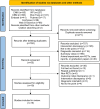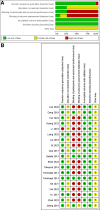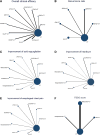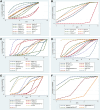The positive role of Chinese herbal medicine as an adjunctive therapy for refractory gastroesophageal reflux disease: A systematic review and network meta-analysis
- PMID: 40419902
- PMCID: PMC12113975
- DOI: 10.1097/MD.0000000000042565
The positive role of Chinese herbal medicine as an adjunctive therapy for refractory gastroesophageal reflux disease: A systematic review and network meta-analysis
Abstract
Background: Proton pump inhibitors are currently the primary treatment option for refractory gastroesophageal reflux disease (rGERD), yet they have limitations, including poor efficacy and potential adverse events. Chinese herbal medicine (CHM) may offer an effective and safe adjunctive therapy.
Methods: This network meta-analysis investigate the adjunctive therapeutic effect and safety of CHM on rGERD. Randomized controlled trials (RCTs) of CHM combined with conventional Western medicine in the treatment of rGERD added to 8 online databases from its inception to January 2024 were systematically searched. Review Manager 5.3 and and Stata 14.0 software were used to conduct pairwise meta-analysis and network meta-analysis of RCTs that met the inclusion criteria. In addition, the methodological quality of RCTs was analyzed using the Cochrane Collaboration Risk of Bias ROB 2.0 assessment tool. This study was registered in PROSPERO (International Prospective Register of Systematic Reviews) (CRD42024532264).
Results: This study included a total of 19 RCTs, comparing 16 CHMs. Pairwise meta-analysis indicated that CHM combined with conventional Western medicine outperformed the latter in terms of overall clinical efficacy, recurrence rate, and symptom improvement. Network meta-analysis suggested that Shugan Jieyu Capsule may significantly enhance overall clinical efficacy, while Buzhongyiqi Granules may significantly reduce the recurrence rate, Sanji Powders may significantly improve symptoms of acid reflux, Shugan Jieyu Capsule may significantly improve symptoms of heartburn, and Shugan Jianpi Hewei Decoction may significantly improve symptoms of esophageal chest pain, Qingweishu Granules may significantly improve the frequency scale for the symptoms of GERD score. No serious adverse events were reported in any of the RCTs.
Conclusion: The findings of this study indicate that CHM offers a positive adjunctive therapeutic benefit for rGERD; however, it is imperative to enhance the quality of future RCTs to validate these preliminary findings.
Keywords: Chinese herbal medicine; network meta-analysis; pairwise meta-analysis; randomized controlled trials; refractory gastroesophageal reflux disease.
Copyright © 2025 the Author(s). Published by Wolters Kluwer Health, Inc.
Conflict of interest statement
The authors have no conflicts of interest to disclose.
Figures












References
-
- Katzka DA, Kahrilas PJ. Advances in the diagnosis and management of gastroesophageal reflux disease. BMJ. 2020;371:m3786. - PubMed
-
- Zhang XY, Yang KL, Wang SQ, et al. Consistency assessment and visualization of recommendations on gastroesophageal reflux disease: a scoping review of clinical practice guidelines. Pol Arch Intern Med. 2023;133:16490. - PubMed
-
- Eusebi LH, Ratnakumaran R, Yuan Y, Solaymani-Dodaran M, Bazzoli F, Ford AC. Global prevalence of, and risk factors for, gastro-oesophageal reflux symptoms: a meta-analysis. Gut. 2018;67:430–40. - PubMed
Publication types
MeSH terms
Substances
LinkOut - more resources
Full Text Sources
Medical
Miscellaneous

